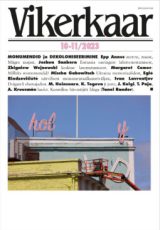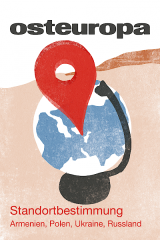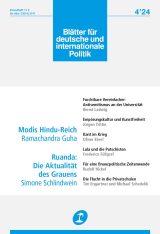Tatiana Zhurzhenko
Researcher at ZOiS (Centre for East European and International Studies) and SCRIPTS Cluster of Excellence, Berlin, and teaches East European Politics at the Department of Political Science, University of Vienna.
Her research addresses memory politics, borders and borderland identities, with a focus on Ukrainian-Russian borderlands. From 2014 to 2018, she was guest editor of the Eurozine focal points Ukraine in European Dialogue and Russia in Global Dialogue.
Her books include War and Memory in Russia, Ukraine and Belarus (co-editor, 2017) and Borderlands into Bordered Lands: Geopolitics of Identity in Post-Soviet Ukraine (2010).
Articles
Land of confusion
Ukraine, the EU and the Tymoshenko case
The Ukraine-European Union summit, originally planned for 19 December, was to have brought talks on an Association Agreement between Ukraine and the EU to a conclusion. However the conflict over the prosecution of Yuliya Tymoshenko has endangered the process, raising serious doubts about the European aspirations of the current Ukrainian leadership. The country’s future hangs in the balance, writes Tatiana Zhurzhenko.
The politics of no alternatives or How power works in Russia
An interview with Gleb Pavlovsky
Gleb Pavlovsky, the Ukrainian-born former dissident turned “political technologist”, abruptly fell out with the Kremlin in April, reportedly over “indiscreet comments” made about the 2012 presidential elections. In interview with Transit a short while before, Pavlovsky gave a revealing inside view of the workings of political power in the former Soviet Union and in post-Soviet Russia.
The controversy around the statue of the Soviet soldier in Tallinn in April 2007 provided a striking demonstration that Russia remains both an external and an internal factor in the national narratives of the post-Soviet space. Here, history is used to lay claim to European identity and as a means of emancipation from Moscow. In the former socialist satellite states, meanwhile, nationalists are using their opponents’ communist pasts for political capital. Tatiana Zhurzhenko suggests that before we talk about European solidarity, we need to trace the emergent fault lines running through eastern European memory.
Inner-party factionalism, political compromises, and corruption scandals: the year following the Orange Revolution has been an annus horribilis for the new Ukrainian government. Added to its woes have been setbacks in foreign relations, first in signing a detrimental deal with Russia over gas supplies, second in having its aspirations for EU membership thwarted. Despite improvements in democratic freedoms, the Orange movement feels let down by its political representatives. Just how far this is the case emerged when the votes were counted in the elections on 26 March.
Roses, oranges... and coca
What remains of revolutions in the globalized world?
Why has no one called the victory of Bolivian president Evo Morales a “revolution”, despite it sharing some of the characteristics of the “coloured revolutions” in post-Soviet countries? Because unlike the politics of the coloured revolutionaries, which has been about complying with Western norms and values, the leftist nationalism of Morales challenges the established hierarchy of the global order, says Tatiana Zhurzhenko. Is Morales’s victory an anachronism, the last socialist revolution of the twentieth century, or a new type of response to social injustice from outside globalization’s charmed circle?
Have borders become irrelevant with the project of a united Europe, which is supposed to overcome the historical divisions of the continent and the political isolation of its East? No, just the opposite. In a focal point guest-edited by Tatiana Zhurzhenko, essayists and researchers look at the dilemmas of border building and cross-border cooperation in the EU and its neighbourhood.
The Myth of Two Ukraines
A Commentary on Mykola Riabchuk's "Ukraine: One State, two Countries"?
Most intellectuals agree that Ukraine is dramatically polarized along an East-West axis. The differences manifest themselves in linguistic differences and cultural orientation, especially however in different interpretations of the national history. How can this split be overcome in order to avoid a drifting apart between the ‘europeanized’ West and the more ‘russified’ East?


